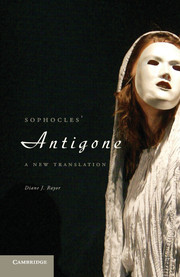Bacon, H. H. 1994/5. The chorus in Greek life and drama. Arion 3 (1): 6–24.
Barrett, J. 2002. Staged narrative: Poetics and the messenger in Greek tragedy. Berkeley: University of California Press.
Blundell, M. W. 1989. Helping friends and harming enemies: A study in Sophocles and Greek ethics. Cambridge: Cambridge University Press.
Bradshaw, A. T. 1962. The watchman scenes in the Antigone. Classical Quarterly 12 (2): 200–11.
Bushnell, R. W. 1988. Prophesying tragedy: Sign and voice in Sophocles' Theban plays. Ithaca: Cornell University Press.
Csapo, E. and Slater, W. J.. 1995. The context of ancient drama. Ann Arbor: University of Michigan Press.
Clarke, M. 2001. Thrice-ploughed woe (Sophocles, Antigone 859). Classical Quarterly 51 (2): 368–73.
Cropp, M. 1997. Antigone's final speech (Sophocles, Antigone 891–928). Greece & Rome 44 (2): 137–60.
Cullyer, H. 2005. A wind that blows from Thrace: Dionysus in the fifth stasimon of Sophocles' “Antigone.”Classical World 99 (1): 3–20.
Demand, N. H. 1994. Birth, death, and motherhood in classical Greece. Baltimore: Johns Hopkins University Press.
,Didaskalia. http://www.didaskalia.net.
Foley, H. P. 2001. Female acts in Greek tragedy. Princeton: Princeton University Press.
Garrison, E. 1989. Eurydice's final exit to suicide in the “Antigone.”Classical World 82 (6) 431–5.
Goldhill, S. 2007. How to stage Greek tragedy today. Chicago: University of Chicago Press.
Griffith, M., ed. 1999. Sophocles: Antigone. Cambridge Greek and Latin Classics. Cambridge: University of Cambridge Press. [Greek edition, with excellent introduction and commentary.]
Griffith, M. 2005. The subject of desire in Sophocles' Antigone. In The soul of tragedy: Essays on Athenian drama. Eds., Pedrick, V. and Oberhelman, S. M., 91–135. Chicago: University of Chicago Press.
Holt, P. 1999. Polis and tragedy in the “Antigone.”Mnemosyne 52 (6): 658–90.
Kirkwood, G. M. 1994. A study of Sophoclean drama. Ithaca: Cornell University Press.
Knox, B. M. W. 1964. The heroic temper. Studies in Sophoclean tragedy. Berkeley: University of California Press.
Lawler, L. B. 1964. The dance in ancient Greece. Middletown, CT: Wesleyan University Press.
Ley, G. 2006. A short introduction to the ancient Greek theater. Revised ed. Chicago: University of Chicago Press.
Mackay, E. A. 1989. Fugard's The Island and Sophocles' Antigone within the parameters of South African protest literature. In Literature and revolution. Ed. Bevan, D., 145–62. Amsterdam: Editions Rodopi.
Morwood, J. 1993. The double time scheme in Antigone. Classical Quarterly 43 (1): 320–1.
Murnaghan, S. 1986. Antigone 904–920 and the institution of marriage. American Journal of Philology 107 (2): 192–207.
Nelli, M. F. 2009. Identity, dignity and memory: Performing/re-writing Antigone in post-1976 Argentina. New Voices in Classical Reception Studies 4: 70–82.
Neuburg, M. 1990. How like a woman: Antigone's ‘inconsistency.’Classical Quarterly 40 (1): 54–76.
Padel, R. 1995. Whom gods destroy. Princeton: Princeton University Press.
Rayor, D. J. 1991. Sappho's lyre: Archaic lyric and women poets of ancient Greece. Berkeley: University of California Press.
Rayor, D. J. 2004. The Homeric hymns. Berkeley: University of California Press.
Rehm, R. 1992. Greek tragic theatre. London: Routledge.
Rehm, R. 1994. Marriage to death: The conflation of wedding and funeral rituals in Greek tragedy. Princeton: Princeton University Press.
Roberts, D. H. 1988. Sophoclean endings: another story. Arethusa 21 (2) 177–96.
Scodel, R. 1984a. Epic doublets and Polynices' two burials. Transactions of the American Philological Association 114: 49–58.
Scodel, R. 1984b. Sophocles. Boston: Twayne Publishers.
Scodel, R. 2005. Sophoclean tragedy. In A companion to Greek tragedy. Ed. Gregory, J., 233–50. Malden, MA: Blackwell Publishing.
Scullion, S. 1998. Dionysos and katharsis in “Antigone.”Classical Antiquity 17 (1): 96–122.
Segal, C. 1981. Tragedy and civilization: An interpretation of Sophocles. Cambridge, MA: Harvard University Press.
Segal, C. 1995. Sophocles' tragic world: Divinity, nature, society. Cambridge, MA: Harvard University Press.
Steiner, G. 1986. Antigones. Oxford: Oxford University Press.
Taplin, O. 2003. Greek tragedy in action. 2nd ed. London: Routledge.
Tyrrell, W. B. and Bennett, L. J.. 1998. Recapturing Sophocles' Antigone. Lanham, MD: Rowman & Littlefield Publishers.
Walton, J. M. 2006. Found in translation: Greek drama in English. Cambridge: Cambridge University Press.
Wiles, D. 1997. Tragedy in Athens: Performance space and theatrical meaning. Cambridge: Cambridge University Press.
Wiles, D. 2000. Greek theatre performance. Cambridge: Cambridge University Press.
Winnington-Ingram, R. P. 1980. Sophocles: An interpretation. Cambridge: Cambridge University Press.
Zeitlin, F. 1990. Thebes: Theater of self and society in Athenian drama. In Nothing to do with Dionysus? Eds. Winkler, J. and Zeitlin, F., 130–67. Princeton: Princeton University Press.



